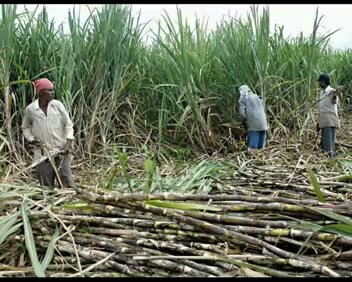Sugarcane Production in India: Current Scenario and Way Ahead
Gafar Laiya
9/26/20243 min read


Sugarcane Production in India: Current Scenario and Way Ahead
Sugarcane, often referred to as "white gold," is one of India's most crucial cash crops. With over 50 million farmers involved in its cultivation, sugarcane contributes significantly to the country's rural economy. India is the second-largest producer of sugarcane globally, accounting for approximately 15% of the world's production. However, despite its importance, the sugarcane industry faces numerous challenges, threatening the livelihoods of millions of farmers and the sustainability of this vital crop.
Importance of Sugarcane Crop
Sugarcane is a vital crop for several reasons:
1. Economic significance: Sugarcane provides employment and income to millions of farmers and agricultural laborers.
2. Food security: Sugarcane is the primary source of sugar, a staple commodity in every Indian household.
3. Energy source: Sugarcane bagasse (residue) is used to generate bioelectricity and biofuels.
4. Export earnings: India exports significant quantities of sugar, generating substantial foreign exchange.
Opportunities in Sugarcane Production
1. Ethanol production: Sugarcane can be converted into ethanol, providing a sustainable alternative to fossil fuels.
2. Bioelectricity generation: Sugarcane bagasse can power rural areas and reduce reliance on fossil fuels.
3. Organic farming: Shifting to organic sugarcane farming can tap into the growing demand for organic products.
Past Mistakes in Sugarcane Farming
1. Over-reliance on chemicals: Excessive use of chemical fertilizers and pesticides has compromised soil health, contaminated water sources, and harmed human health.
2. Water mismanagement: Inefficient irrigation practices have led to water scarcity, reduced crop yields, and increased energy consumption.
3. Lack of crop diversification: Monoculture farming has made farmers vulnerable to market fluctuations and crop failures.
Consequences of Chemical-Intensive Sugarcane Farming
1. Soil degradation: Chemical fertilizers have depleted soil nutrients, reduced fertility, and increased soil erosion.
2. Water pollution: Chemical runoff has contaminated rivers, lakes, and groundwater, affecting human and animal health.
3. Farmer distress: High input costs, low yields, and market volatility have led to farmer suicides and abandonment of sugarcane cultivation.
Miserable Conditions of Sugar Mills and Their Losses
1. Inefficient operations: Outdated technology and mismanagement have resulted in significant losses for sugar mills.
2. Payment delays: Farmers often face delays in receiving payment for their sugarcane, exacerbating financial hardship.
3. Unsustainable pricing: Low sugarcane prices have made it challenging for farmers to cover production costs.
Plight of Small and Marginal Farmers
The sugarcane farming crisis disproportionately affects small and marginal farmers, who are heavily dependent on this crop. With poor prices, late cutting, increased pest and diseases, and dependencies on costly chemicals, sugarcane farming is slowly losing its charm. If these problems are not addressed on a priority basis, the consequences will be devastating:
1. Loss of livelihood: Small and marginal farmers will struggle to survive, leading to increased poverty and migration.
2. Decreased food security: Reduced sugarcane production will impact sugar availability and affordability.
3. Rural economic downturn: The decline of sugarcane farming will have a ripple effect on rural economies.
Revitalizing Sugarcane Farming: The Way Ahead
1. Sustainable agriculture practices: Adopt organic and regenerative farming methods to improve soil health, reduce chemical use, and promote biodiversity.
2. Crop diversification: Encourage farmers to grow multiple crops, reducing dependence on sugarcane and increasing resilience to market fluctuations.
3. Efficient irrigation systems: Implement drip irrigation and precision agriculture to conserve water and reduce energy consumption.
4. Supportive policies: Implement policies ensuring fair pricing, timely payments, and incentives for sustainable farming practices.
Gujarat Bio Organics P. Ltd Role in Sugarcane Farming
Gujarat Bio Organics P. Ltd has pioneered a revolutionary approach to sugarcane farming with its Sugarcane Special Blend. This innovative solution has transformed the lives of farmers by:
1. Enhancing germination rates: Close to 100% germination ensures optimal crop establishment.
2. Promoting healthy growth: Higher sugarcane growth, better tillering, robust cane with larger diameter, and increased sugarcane weight.
3. Reducing chemical usage: Minimum 50% reduction in chemical fertilizers and pesticides.
4. Boosting production: 10% to 70% increase in production.
Read This: Success Stories of Sugarcane Farmer
About Us
Discover Gujarat Bio Organics Pvt. Ltd, India's leading organic fertilizer manufacturer. We offer crop-specific blends for apple, potato, and mango, empowering farmers with innovative and eco-friendly farming practices for sustainable agricultural growth.
GUJARAT BIO ORGANICS PRIVATE LIMITED
Leading Best Organic fertilizer manufacturer in india
sales@gujaratbioorganics.com
+91 9978791167
© 2025. All rights reserved.
